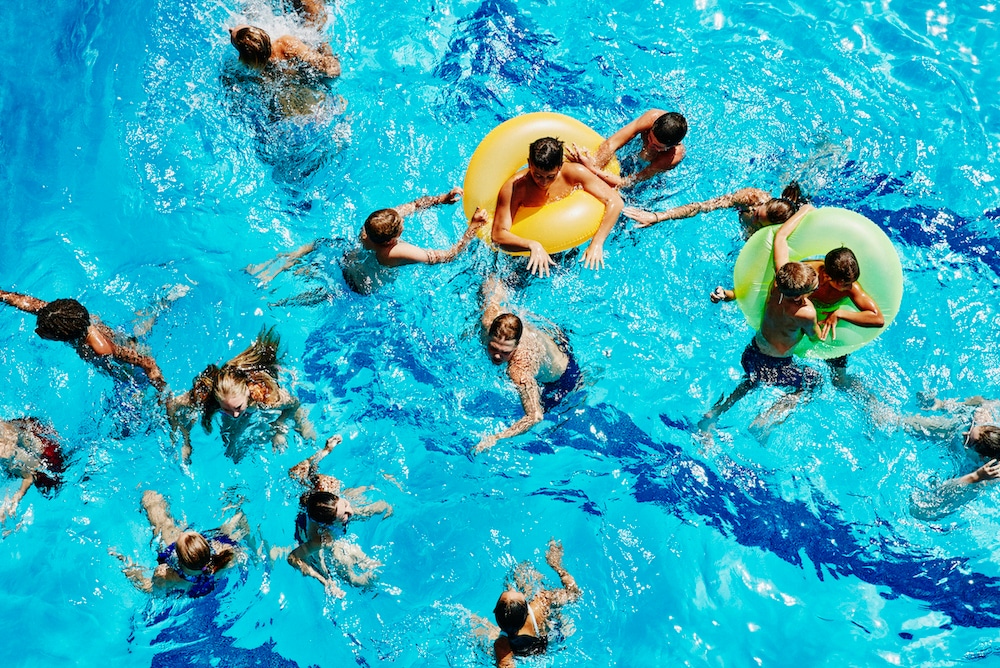For families, the swimming pool meets a lot of different needs during the summer. It’s a cool spot for kids to seek refuge on sweltering days, a self-contained play space, a place to burn energy so bedtime is easier and, to some parents, it’s even a substitute for bathtime.
On the Internet, parents have long debated the effectiveness of the “pool bath” or “summer bath,” as many call it. Essentially, some argue a dip in the pool counts as a bath, and they look forward to bathing kids less often during the summer as a result. Others say there’s no way they’d let their kids skip washing off the chemicals and potential ickiness they might find in a pool.
Here’s a peek at some of the back and forth in this debate in the past few years:
Samantha Brinn Merel, mom of two in White Plains, New York, says she usually makes her two kids shower after swimming in their pool at home, but she’s not against a swimming pool bath. “If it’s an evening swim, as opposed to an all-day pool situation with multiple sunscreen applications,” she says, “I sometimes treat the pool like a bath and then pat myself on the back for avoiding the 30-minute bath and shower dance.”
Madeleine Sommerville, mom of one from Alberta, Canada, lands on the other side of the summertime debate. “If my daughter doesn’t shower after swimming, she stinks like a pool the next day,” Sommerville says. “Her skin also gets super dry so I have to put on moisturizer.”
Is it gross to not shower after the pool?
Parents’ rules on the post-pool shower or bath may vary, so in order to get to the bottom of the “pool bath” debate, we asked Dr. Kristie Hayes, a pediatric dermatologist and associate professor of dermatology at the University of Nebraska Medical Center, and Dr. Amy Baxter, a pediatric emergency physician in Atlanta, Georgia, to weigh in.
Experts agree swimming doesn’t take the place of a bath
While we hate to add an extra step to your summer bedtime routine, according to our experts, swimming isn’t quite the same thing as taking a regular bath.
Here’s why kids need to shower after the pool
Skipping the shower or bath after swimming isn’t necessarily going to harm kids, but there are three major reasons why it’s a good idea to rinse off after a swim:
1. Chlorine kills germs and bacteria but it also has its limitations
While pools are chlorinated to kill germs, substances like urine, sweat, makeup and lotion that are brought into pools by swimmers can react with chlorine and reduce its ability to kill viruses and bacteria, according to the Water Quality and Health Council. Most public pools instruct patrons to shower before swimming to reduce the risk of contamination. Unfortunately, a 2019 survey by the same council found 51% of Americans use the pool as a “communal bath” where they rinse off after exercising, doing yardwork and as a substitute for taking a shower.
2. Swimming pools are not a sterile environment
In a bath or shower, you scrub your body with soap and water to remove built-up oils, dead skin and pathogens. When you swim in a pool, you’re essentially floating in a giant tub with whomever else is there — and being exposed to whatever dirt and germs they brought along with them.
In 2019, the Centers for Disease Control and Prevention (CDC) issued a warning about the growing presence of the fecal parasite Cryptosporidiosis in public pools. This chlorine-resistant bug causes diarrhea, nausea and cramping. Adenoviruses, which cause stomach and respiratory infections, may also be present, says Baxter, in addition to E. Coli and Salmonella. These pathogens are sometimes transmitted in water via the presence of fecal matter, saliva or vomit.
3. Lingering chlorine can cause dry skin, itchiness and odor
“For children with eczema, allergies or asthma, their potential sensitivity to pool water makes at least a clean water rinse after swimming a good idea,” says Baxter. “Even kids without an underlying skin condition are likely to get some itching or dryness if they exclusively use the pool as a bath.”
“I would suggest that a shower after swimming is beneficial for skin health,” says Hayes, “because we know that shared spaces like swimming pools are potential sources of bacteria, viruses, mold and other infectious pathogens, and that is well-documented.”
What happens if kids don’t shower after the pool?
Baxter says it’s unlikely kids will get seriously ill from a dip in the pool. “Outbreaks have almost always been when the chlorine levels are too low,” she explains. “For a well-maintained community pool, risks are extremely low.”
Backyard pools may present an even smaller risk since there are generally fewer swimmers, and it’s easier to monitor the level of chemicals in the pool. Nonetheless, says Hayes, parents should be aware that a threat exists. “Parents don’t know if a child could have a small cut or injury to the skin that could be a point of entry for infection while swimming,” she says. “You are exposed to potential infections from others who share the water with you even if that water is monitored and treated routinely.”
Best practices for pool hygiene
Even though treated community and backyard pools are generally safe, Baxter encourages parents to closely follow pool rules regarding diapers, bathroom accidents and general hygiene.
To keep skin healthy and minimize the potential for any kind of infection, Hayes suggests:
- Showering before entering the pool.
- Washing the skin and outer ears after swimming.
- Wearing protective footwear at the poolside and in public showers.
- Avoiding swallowing pool water.
“I am usually a proponent of short daily baths for active kids,” Hayes says. This applies whether kids have been swimming or just doing regular activities. Baths may be less frequent in the winter or when kids are less active. One big exception to daily baths would be if kids have chronic skin conditions that are exacerbated by frequent washing, Hayes adds.
Personal comfort and preference also plays a role, and you’re certainly not doing anything wrong as a parent if your child takes a bath less often or skips the shower after swimming once in a while.
“Each person needs an appropriate personalized regimen that keeps them comfortable in their own skin,” Hayes says.






